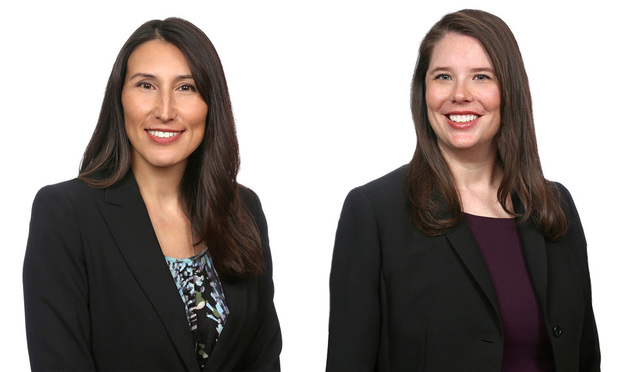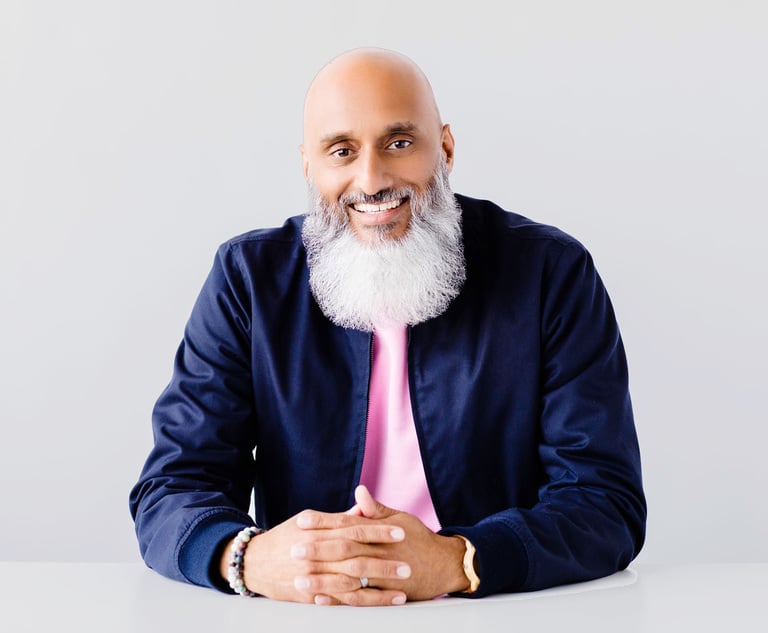Key Considerations in Addressing Harassment and Discrimination in Law Firms
As the problem of sexual harassment and discrimination in the workplace has again come to the forefront in recent years, many law firms have taken a hard look at whether their firm's culture permits or even promotes harassment and discrimination. Besides the primary goal of creating a work environment free of harassment and discrimination, many law firms are reviewing how they address attorney compensation and promotions to ensure that their systems are as objective as possible.
January 02, 2019 at 11:27 AM
6 minute read
 Shari Klevens, left, and Alanna Clair, Dentons. Courtesy photo
Shari Klevens, left, and Alanna Clair, Dentons. Courtesy photo
As the problem of sexual harassment and discrimination in the workplace has again come to the forefront in recent years, many law firms have taken a hard look at whether their firm's culture permits or even promotes harassment and discrimination. Besides the primary goal of creating a work environment free of harassment and discrimination, many law firms are reviewing how they address attorney compensation and promotions to ensure that their systems are as objective as possible.
The American Bar Association took action to make clear that engaging in sexual harassment and discrimination is inconsistent with an attorney's ethical obligations. In 2016, the ABA adopted Rule 8.4(g) of the Model Rules of Professional Conduct, which provides that it is professional misconduct for a lawyer to “engage in conduct that the lawyer knows or reasonably should know is harassment or discrimination on the basis of race, sex, religion, national origin, ethnicity, disability, age, sexual orientation, gender identity, marital status or socioeconomic status in conduct related to the practice of law.”
The adoption of Rule 8.4(g) was the subject of much debate in the legal profession. Some considered it a welcome step to reinforce that harassment and discrimination will not be tolerated, which aligned the model rules with rules previously adopted by a number of states to address such conduct. However, others objected to the rule on a variety of grounds, including based on concerns that the rule infringes on an attorney's free speech rights. Indeed, the Texas Attorney General issued an opinion concluding that Rule 8.4(g) is unconstitutional for that reason, among others.
While many states have resisted adoption of Rule 8.4(g), California forged its own path in adopting a separate rule that expands on the provisions of the ABA Model Rule. Indeed, Rule 8.4.1 of the recently revised California Rules of Professional Conduct is titled “Prohibited Discrimination, Harassment and Retaliation” and details conduct prohibited “[i]n representing a client, or in terminating or refusing to accept the representation of any client” as well as conduct prohibited “[i]n relation to a law firm's operations.”
For law firms, the conduct prohibited under Rule 8.4.1 includes, among other conduct, to “unlawfully discriminate or knowingly permit unlawful discrimination” on the basis of any protected characteristic (defined to include race, sex, and a number of other characteristics) and to “unlawfully harass or knowingly permit the unlawful harassment” of firm employees and other listed persons. The phrase “knowingly permit” is defined as “to fail to advocate corrective action where the lawyer knows of a discriminatory policy or practice that results in the unlawful discrimination or harassment prohibited by [the rule].” Rule 8.4.1 further addresses disciplinary charges issued under the rule and clarifies that certain conduct is not prohibited by the rule, including the representation of clients alleged to have engaged in unlawful discrimination, harassment, or retaliation and providing advice as otherwise required or permitted by the California Rules of Professional Conduct.
Thus, it is helpful for law firms in California to consider whether any action may be necessary to ensure compliance with Rule 8.4.1. However, regardless of the jurisdiction, there are steps that attorneys and firms can take to proactively address the risks of discrimination and harassment.
Maintain a Positive Culture
The goal for any firm is to create a culture where it is clear that discrimination and harassment are not tolerated. The prevailing attitude of attorneys in a firm can contribute to whether attorneys feel comfortable reporting harassment or discrimination, or whether their reports are demonized. Indeed, the reality is that discrimination or harassment can occur at any firm, as even the most supportive environments can have bad actors. However, the environs in a firm may help shape whether such conduct is openly reported or discouraged.
One step that can help develop a positive firm culture is mentoring programs for younger attorneys – whether official or unofficial. A strong mentoring program can also help guide younger attorneys regarding what is and is not appropriate behavior and send the message that harassment is unacceptable from anyone at the firm. This is especially important given that attorneys new to the practice of law may have different understandings regarding what is acceptable conduct in a workplace environment.
Reevaluate Firm Events
Law firm social events can be a great way to build camaraderie and to reward attorneys and staff for their hard work. However, some social events can be ripe for harassment or other inappropriate behavior.
To minimize these risks, some law firms are implementing policies governing firm-sponsored social activity. Colleagues can also hold each other accountable and intervene in situations where someone's behavior appears to be getting out of control.
Consider Modern Norms
When it comes to the work environment, law firms cannot afford to live in the past by maintaining unwritten rules that deprive attorneys of equal opportunities within the firm. For example, one vestige of the past is the practice of some male attorneys who are concerned about the appearance of impropriety when alone in a professional or social setting with any woman other than their wives. This practice has received renewed attention in recent years, known to some as the “Mike Pence Rule.” In response, some senior male attorneys in law firms might avoid traveling, attending social events, or holding closed-door meetings with their female colleagues, and likely would also decline to act as a mentor for a younger female attorney.
Although the issue is one apparently grounded in attorneys' concerns about reputation, the problems with this rule in the workplace are obvious (and numerous). For example, a male senior attorney who refuses to travel to meet clients with a female colleague arguably deprives that colleague of important career opportunities based on her sex. Some of the most important components of an attorney's development from junior associate to senior partner come from mentoring and sponsorship opportunities. A lack of those opportunities is a significant impediment to the success of an attorney in the workplace.
Law firms that rely on such outdated notions do so at their own risk. Not only can such practices lead to discrimination claims against the firm, but in today's changing society law firms grounded in the past risk being rendered obsolete.
Shari L. Klevens is a partner at Dentons US and serves on the firm's US Board of Directors. She represents and advises lawyers and insurers on complex claims, is co-chair of Dentons' global insurance sector team, and is co-author of “California Legal Malpractice Law” (2014). Alanna Clair is a partner at Dentons US and focuses on professional liability defense. Shari and Alanna are co-authors of “The Lawyer's Handbook: Ethics Compliance and Claim Avoidance.”
This content has been archived. It is available through our partners, LexisNexis® and Bloomberg Law.
To view this content, please continue to their sites.
Not a Lexis Subscriber?
Subscribe Now
Not a Bloomberg Law Subscriber?
Subscribe Now
NOT FOR REPRINT
© 2025 ALM Global, LLC, All Rights Reserved. Request academic re-use from www.copyright.com. All other uses, submit a request to [email protected]. For more information visit Asset & Logo Licensing.
You Might Like
View All
Redeveloping Real Estate After Natural Disasters: Challenges, Strategies and Opportunities
6 minute read
The Time Is Now for Employers to Assess Risk of Employees’ Use of DeepSeek
4 minute read
Loopholes, DNA Collection and Tech: Does Your Consent as a User of a Genealogy Website Override Another Person’s Fourth Amendment Right?

Trending Stories
- 1ACC CLO Survey Waves Warning Flags for Boards
- 2States Accuse Trump of Thwarting Court's Funding Restoration Order
- 3Microsoft Becomes Latest Tech Company to Face Claims of Stealing Marketing Commissions From Influencers
- 4Coral Gables Attorney Busted for Stalking Lawyer
- 5Trump's DOJ Delays Releasing Jan. 6 FBI Agents List Under Consent Order
Who Got The Work
J. Brugh Lower of Gibbons has entered an appearance for industrial equipment supplier Devco Corporation in a pending trademark infringement lawsuit. The suit, accusing the defendant of selling knock-off Graco products, was filed Dec. 18 in New Jersey District Court by Rivkin Radler on behalf of Graco Inc. and Graco Minnesota. The case, assigned to U.S. District Judge Zahid N. Quraishi, is 3:24-cv-11294, Graco Inc. et al v. Devco Corporation.
Who Got The Work
Rebecca Maller-Stein and Kent A. Yalowitz of Arnold & Porter Kaye Scholer have entered their appearances for Hanaco Venture Capital and its executives, Lior Prosor and David Frankel, in a pending securities lawsuit. The action, filed on Dec. 24 in New York Southern District Court by Zell, Aron & Co. on behalf of Goldeneye Advisors, accuses the defendants of negligently and fraudulently managing the plaintiff's $1 million investment. The case, assigned to U.S. District Judge Vernon S. Broderick, is 1:24-cv-09918, Goldeneye Advisors, LLC v. Hanaco Venture Capital, Ltd. et al.
Who Got The Work
Attorneys from A&O Shearman has stepped in as defense counsel for Toronto-Dominion Bank and other defendants in a pending securities class action. The suit, filed Dec. 11 in New York Southern District Court by Bleichmar Fonti & Auld, accuses the defendants of concealing the bank's 'pervasive' deficiencies in regards to its compliance with the Bank Secrecy Act and the quality of its anti-money laundering controls. The case, assigned to U.S. District Judge Arun Subramanian, is 1:24-cv-09445, Gonzalez v. The Toronto-Dominion Bank et al.
Who Got The Work
Crown Castle International, a Pennsylvania company providing shared communications infrastructure, has turned to Luke D. Wolf of Gordon Rees Scully Mansukhani to fend off a pending breach-of-contract lawsuit. The court action, filed Nov. 25 in Michigan Eastern District Court by Hooper Hathaway PC on behalf of The Town Residences LLC, accuses Crown Castle of failing to transfer approximately $30,000 in utility payments from T-Mobile in breach of a roof-top lease and assignment agreement. The case, assigned to U.S. District Judge Susan K. Declercq, is 2:24-cv-13131, The Town Residences LLC v. T-Mobile US, Inc. et al.
Who Got The Work
Wilfred P. Coronato and Daniel M. Schwartz of McCarter & English have stepped in as defense counsel to Electrolux Home Products Inc. in a pending product liability lawsuit. The court action, filed Nov. 26 in New York Eastern District Court by Poulos Lopiccolo PC and Nagel Rice LLP on behalf of David Stern, alleges that the defendant's refrigerators’ drawers and shelving repeatedly break and fall apart within months after purchase. The case, assigned to U.S. District Judge Joan M. Azrack, is 2:24-cv-08204, Stern v. Electrolux Home Products, Inc.
Featured Firms
Law Offices of Gary Martin Hays & Associates, P.C.
(470) 294-1674
Law Offices of Mark E. Salomone
(857) 444-6468
Smith & Hassler
(713) 739-1250






